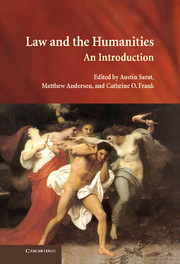Book contents
- Frontmatter
- Contents
- Contributors
- Acknowledgments
- Introduction: On the Origins and Prospects of the Humanistic Study of Law
- I PERSPECTIVES ON THE HISTORY AND SIGNIFICANCE OF SCHOLARSHIP IN LAW AND THE HUMANITIES: THREE VIEWS
- II IDEAS OF JUSTICE
- 4 Biblical Justice: The Passion of the God of Justice
- 5 Ideas of Justice: Natural and Human
- 6 Ideas of Justice: Positive
- 7 Postmodern Justice
- III IMAGINING THE LAW
- IV LINGUISTIC, LITERARY, AND CULTURAL PROCESSES IN LAW
- V INSTITUTIONAL PROCESSES
- Index
- References
4 - Biblical Justice: The Passion of the God of Justice
Published online by Cambridge University Press: 20 January 2010
- Frontmatter
- Contents
- Contributors
- Acknowledgments
- Introduction: On the Origins and Prospects of the Humanistic Study of Law
- I PERSPECTIVES ON THE HISTORY AND SIGNIFICANCE OF SCHOLARSHIP IN LAW AND THE HUMANITIES: THREE VIEWS
- II IDEAS OF JUSTICE
- 4 Biblical Justice: The Passion of the God of Justice
- 5 Ideas of Justice: Natural and Human
- 6 Ideas of Justice: Positive
- 7 Postmodern Justice
- III IMAGINING THE LAW
- IV LINGUISTIC, LITERARY, AND CULTURAL PROCESSES IN LAW
- V INSTITUTIONAL PROCESSES
- Index
- References
Summary
The diverse and multivocal books of the Hebrew Bible may share a preoccupation with one theme that incorporates notions of reward and punishment, blessing and curse, compassion and anger: justice. As James Crenshaw writes, “The qualit[y] of justice…runs through the Bible like a red thread. [It is] intricately woven into the various literary forms that enliven its pages from beginning to end.” As prominent as this theme is, however, the Hebrew Bible never offers us a definition, theory, or “idea” of justice. Nicholas Wolterstorff notes that the biblical authors
speak a great deal about what is just and unjust; every now and then they step back a bit to speak about the role of justice in God's life and ours. What they do not do is step up to the meta-level and talk about how to think about justice. They do not articulate a conception of justice. We ourselves have to extract the underlying pattern of their thought from their testimony.
One such underlying pattern may indeed be the demand for retribution. It is perhaps an old cliché that the Old Testament is consumed with judgment and retaliation whereas the New Testament transcends these baser concerns with a Christian emphasis on compassion and love. Passages that align the Hebrew Bible with “primitive” notions of unthinking vengefulness include the famous “eye for an eye” law of talion, and the description of God (Yhwh) in Exodus as “a jealous God, punishing children for the iniquity of parents, to the third and the fourth generation” (Exod 34:6–7).
- Type
- Chapter
- Information
- Law and the HumanitiesAn Introduction, pp. 125 - 140Publisher: Cambridge University PressPrint publication year: 2009

